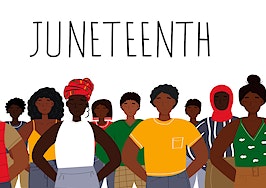In a shifting real estate market, the guidance and expertise that Inman imparts is never more valuable. Whether at our events, or with our daily news coverage and how-to journalism, we’re here to help you build your business, adopt the right tools — and make money. Join us in person in Las Vegas at Connect, and utilize your Select subscription for all the information you need to make the right decisions. When the waters get choppy, trust Inman to help you navigate.
Statistics show that the United States and the residential housing market are becoming more diverse. This provides an opportunity for real estate professionals to reach more clients and grow their businesses.
Brokers and team leaders need to continually reevaluate their business model and strategies to make sure they are providing the best customer service, and creating a work environment where employees and independent contractors can thrive.
Diverse businesses outperform their homogenous competitors in innovation, employee retention and profit. But to take advantage of this opportunity, you’ll need to strengthen your understanding of cultural diversity and incorporate a diverse business strategy.
Step 1: Learn more about diversity and cultural differences
Learning more about diversity and other cultures helps us understand different perspectives and dispel negative stereotypes and personal biases about different groups. Attending diversity training classes helps you understand and become more comfortable with concepts such as unconscious bias and cultural competency.
Having respect for cultural differences and learning basic characteristics of other cultures can help you avoid misunderstandings and unintentionally offending others. Learning more about diversity will also help you identify ways that you can better serve a wide range of potential clients.
Step 2: Be aware of inequalities and inequities
Sadly, the real estate industry has a disturbing history of unequal access to homeownership. It is important to understand that this history has had long-lasting effects on many communities and recognize that people from historically marginalized communities may be experiencing the path to homeownership differently based on their individuality.
It is also important to understand the difference in the terms equality and equity. Equality means each individual or group of people is given the same resources or opportunities.
Equity recognizes that each person has different circumstances and allocates the exact resources and opportunities needed to reach an equal outcome. In real estate, this may come in the form of down payment assistance or affordable homeownership options. Becoming familiar with these resources will provide you with more options to provide to a wider range of clients.
Step 3: Build a diverse team
Having a variety of people from a wide range of backgrounds brings different approaches, experiences and skills. According to this McKinsey report, businesses with high ethnic diversity outperform their counterparts by 35 percent. But there are many different dimensions of diversity to consider and there are also many definitions of a team.
Diversifying your team may mean including people who have different genders, sexual orientations, religions or abilities. It could also mean including people with different beliefs or perspectives. If you do not have an actual “team,” your team could simply be your lender or the home inspectors and contractors you use and refer clients to.
Partnering with people from different backgrounds brings fresh insight and expertise. For real estate teams to thrive, you need people who think and behave differently from each other. The best way to reach a diverse audience is to have a diverse team.
Step 4: Get involved in your community
People do business with real estate agents they know, like, and trust. This trust is often built by being visible in your community. Community involvement and community partnerships help us grow ourselves personally and also help grow our businesses. Building relationships with local places of worship, neighborhood organizations and local nonprofits will create new business, referrals and lasting friendships within the community.
Hosting homebuyer seminars, coordinating neighborhood get-togethers or organizing fundraising events are great ways to meet people in the community and provide a needed service. This also helps them identify you as their resource when it comes to anything real estate-related.
Step 5: Create inclusive advertising and marketing
In any real estate business, advertising and marketing are critical elements. Make sure your advertising and marketing plans are inclusive. Inclusion is more than geography and location; it is an attitude and perspective that values each human being as innately deserving of respect and attention.
Be sure you’re following fair housing guidelines and are describing the property, not an ideal person. Ask yourself, “Am I doing anything that is inconsistent with fair housing laws or that may reduce my reach?” Remember to make sure your websites and videos enable access for people with disabilities so that your services are reaching everyone.
Step 6: Implement consistent practices and policies
Being consistent in your everyday practices ensures that every consumer you meet is treated equally and fairly. Have a policies and procedures manual that you and your team read and follow on a daily basis. Be sure you follow the same practices and procedures with every client, every time.
Not only does this help avoid discrimination and fair housing violations, but it also ensures that you’re providing the same excellent service to every client, every time. You may want to create consistent practices and policies for the following areas:
- Availability of properties
- Buyer consultations and listing presentations
- Financial questions
- Neighborhood focus
- Showing properties
- Submitting and presenting offers
By increasing diversity in your workplaces and in your business strategy, you will appeal to a wider audience and reach more clients. You will also ensure that you are creating a work environment that employees and independent contractors can thrive in.
As the head of inclusion and belonging for Keller Williams Realty International, Julia Lashay Israel advises, trains and coaches leaders, team members and agents to recognize and address diversity, equity and inclusion opportunities and challenges across the organization.













